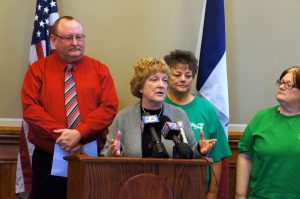Iowa Senate News Release
For Immediate Release: January 25, 2017

Statement by Senator Amanda Ragan of Mason City
“Iowans across the state are worried that Republican budget cuts will endanger vulnerable Iowans, children and dependent adults.
“Cutting the number of people looking out for children at risk is a mistake. We should not cut services to our most vulnerable Iowans.”
Statement by Bill Dickey, retired DHS investigator
I’m here to oppose mid-year cuts to Iowa’s human services budget, cuts that will be permanent. Those cuts would endanger children and adults who need our help. I say this based on my experience working for the Iowa Department of Human Services for 34 years. As a social worker at DHS, I was a caseworker, a supervisor of caseworkers, and finally as an investigator on cases involving children and adults, until I retired in 2014.
The job of a caseworker is to protect people who are at risk of being harmed or abused. The most important thing a caseworker has to offer is their time and attention. That’s why the number of people each caseworker is assigned is so important. The number of cases a worker can handle depends on many factors, including the community, the type of case and other services available.
The basic job, however, is the same everywhere: When you are the caseworker for a foster child, like I was, your job is to be that child’s advocate. That child needs someone dedicated to keeping them safe and able to thrive. That someone is the caseworker and sometimes it’s the child’s only resource.
My ability to do right by the children I was responsible for depended, in part, on how many cases I had. When I started for the State of Iowa, my caseload was 15 to 20. After 15 years, the average caseload had grown to more like 35. Remember, this was for both beginners and experienced caseworkers alike.
Then two things happened. One, we had several tragic cases that got a lot of media attention, such as the Shelby Duis case. The other was the election of Governor Vilsack. Governor Vilsack took an interest and provided the money; caseloads declined. This allowed for caseworkers like me to spend more time and attention on each case we were given and do what was best for the child.
And that’s really the most important thing we had to offer at-risk children, our time and our attention. When Governor Branstad returned to office, caseloads increased, which benefited no one.
I finished my career working as an investigator. During that time, I looked into some very, very sad and tragic cases. Sometimes I saw situations where things could have gone differently. A little more time could have made the outcome easier on the child or senior I was assisting. The toughest cases are complex and difficult and the solutions are never easy. If you’ve got 30 or 35 or even 40 cases, that’s just asking for trouble.
That’s why I’m opposed to these permanent human services budget cuts. They will put children and adults who need our help in danger.
I’m telling legislators today: “Don’t do it. Don’t hurt these children and adults who need our help the most.”
end